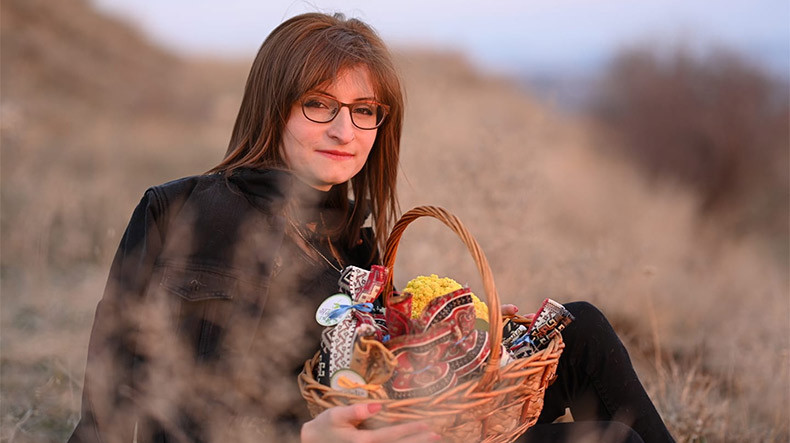
Tea Togh: Artsakh tea, which was born in Togh village and ‘got a second life’ in Yerevan
Tea Togh compositions named "Sirun", "Anush" and "Hrashk" are delivered on an almost daily basis from one of the hostels in Yerevan’s Avan district to different parts of Armenia’s capital – customers' houses, workplaces ... The small tea business started by people from Artsakh is developing slowly.
Last year, the coronavirus pandemic and the restrictions conditioned by it, as well as the online school classes pushed Margarita Grigoryan, a teacher from the village of Togh in Artsakh, into reconsidering her occupation and interests.
Margarita, who was a foreign language teacher at the schools of Mokhrenes and Taghot villages in the Hadrut region, got tired of staying home and began to study the herbs growing in the fields and mountains near her native village. The plants growing in Dizapayt, Dizak and Kataro mountains sparked hope that she could make delicious tea from them, why not, even to sell them.
Margarita used to harvest the plants along with her family members – her husband and three children.
"We used to climb the mountains carrying food and water with us and spend a whole day there. I knew every single bush and tree of Kataro, I knew where a specific plant grew and when to harvest it. There are plants that should be harvested before flowering, while there are plants that should be picked after flowering,” the woman from Hadrut told Panorama.am.
As logical continuation of her activity, the woman was registered as a private entrepreneur and received a certification for her product.
"We failed to get a certificate at the first attempt, because the phytosanitary examination revealed that we had chosen a wrong drying technique. We corrected the mistakes before taking the plants for an examination for the second time in late July or early August, and they turned out to be flawless. From August 20, we had the certificate for “Sirun” and “Anush" and on 20 September we received a certificate for “Hrashk”,” the Artsakh woman said, presenting the first steps in founding the tea brand.
Before coming to Yerevan, students from Togh bought Tea Togh compositions to preset them to their relatives and friends. The war launched in Artsakh on September 27 forced the founder of the tea brand to move to Yerevan.
"People who had already tasted the teas wanted more. We put our business card in each bag for feedback. These people started calling us, asking for more tea deliveries and offering their assistance. They encouraged us to continue our work," the woman said.
The family, who fled the village in the wake of the shootings of the enemy approaching the village, did not even manage to take with them the tea herbs harvested from Togh and the surrounding villages, only managing to take a bunch of thyme and mint. Margarita's husband was among the soldiers wounded in the war. The displaced family was constantly moving from one place to another in Armenia.
In early November, Margarita and other women from Artsakh were invited to "Vostan" to participate in an exhibition and sale.
Margarita turned to one of her acquaintances, who had also launched tea production using the flora of Vayots Dzor Province.
"She told me that she would provide the raw material for the first one hundred tea compositions free of charge. We started the production with the support of that kind person. We printed the logo. Now, thank God, I manage to acquire both the threads and the clothing for the tea bags by selling the teas. The raw material is not from Togh, but we founded the brand in Togh. I call them compositions of nostalgia, because when I make tea compositions, I move in my mind to the Togh mountains, picturing the plants there,” Margarita said.
The woman from Artsakh recalled that she presented the teas in transparent bags at the exhibition.
"I did not have a sewing machine at the time to make the bags. We were homeless. I said well, let them be ‘homeless’ as we were. It was a little bit symbolic," the woman said.
The whole family participates in the tea production, including combination of plants, packaging and delivery. The woman’s injured husband has already recovered and personally delivers the tea orders. The demand is still low, but it has a tendency to increase.
"Teas are ordered as a gift, even to be sent overseas," said the woman, happy with the small success and her tea “trip”.
Now the family is trying to save money to buy a dehydrator. Fresh plants will be available soon. Margarita believes that she will someday climb the Hadrut mountains again to harvest the tea herbs.
.jpg)
.jpg)
.jpg)
.jpg)
.jpg)
Newsfeed
Videos






























